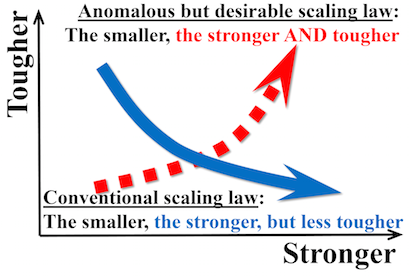Li and Hu Awarded NSF Grant to Study Challenges in Creating Materials that are Both Stronger and Tougher
The National Science Foundation (NSF) awarded University of Maryland (UMD) Associate Professor Teng Li (Mechanical Engineering) and Assistant Professor Liangbing Hu (Materials Science and Engineering) a new grant to address challenges in developing smaller materials that are both stronger and tougher. Li will serve as principal investigator (PI) on the new grant—The Science Underpinning Anomalous Scaling Laws of Strength and Toughness in Nanocellulose Materials—and Hu will be the co-PI. The quest for smaller materials that are both strong and tough is ongoing challenge in advanced material design. Unfortunately, these two mechanical properties are often mutually exclusive. For metals and alloys, their toughness is usually inversely proportional to their strength, and as a result, designing strong and tough materials is a compromise. So far, an effective and efficient approach to addressing the conflict of strength versus toughness still remains elusive. The team's project aims to shed light on a strategy that could resolve the conflict by looking into the fundamental science and properties of cellulose nanopaper. Cellulose nanopaper demonstrates the unique and desirable feature of getting stronger and tougher as the cellulose fiber size decreases. These unique features, combined with cellulose nanopaper's biodegradability, low-cost and scalable manufacturing, can have significant impacts on the bottom-up design of high performance materials with the desired mechanical properties. The research team plans to carry out a systematic framework that will integrate multi-scale mechanics modeling and complementary experiments to establish a quantitative understanding of the mechanical properties of cellulose nanopaper that make it both strong and tough. This fundamental understanding will provide a solid foundation to motivate and enable research on generalizing the underpinning mechanism(s) of attaining both strength and toughness to guide the exploration of a class of strong and tough materials with other highly desirable multi-functionalities.
Related Articles: September 22, 2014 Prev Next |


